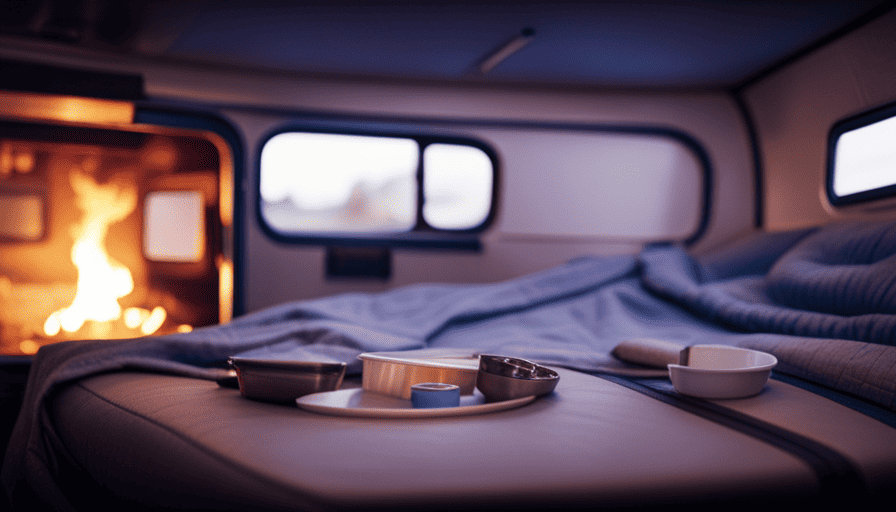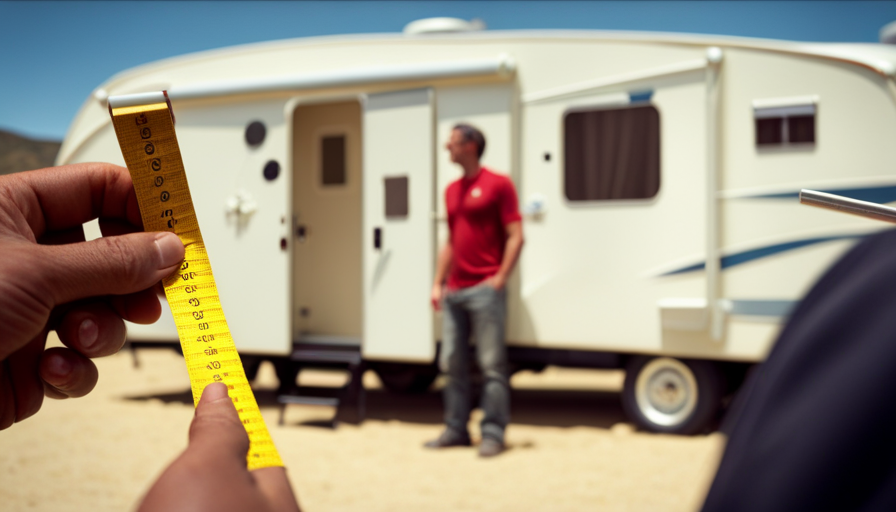The phrase, “Home is where the heart is,” is often accurate. But what happens when our mobile homes become infested with unwanted guests? I am indeed talking about the issue of mice making themselves comfortable in your camper.
Don’t let these tiny intruders drive you nuts! In this article, I will share with you some practical and effective methods to deter mice from your camper.
First things first, we need to seal all entry points to keep those sneaky critters out. Mice can squeeze through the tiniest of openings, so it’s crucial to inspect and seal any gaps or cracks.
Next, cleanliness is key. Keep your camper spotless and free from food crumbs that may attract these unwanted visitors. Additionally, natural deterrents like peppermint oil or mothballs can work wonders in repelling mice.
To further safeguard your camper, store food in airtight containers and remove any potential nesting materials. Consider setting up traps or using electronic repellents for added protection.
Regularly inspect and maintain your camper for any signs of mice, and if the problem persists, don’t hesitate to consult a professional exterminator.
With these practical tips, you can ensure a mouse-free and stress-free camping experience. So, let’s get started on making your camper an unwelcome place for those pesky little rodents!
Key Takeaways
- Seal all entry points to keep mice out.
- Keep the camper clean and free from food crumbs.
- Use natural deterrents like peppermint oil or mothballs.
- Consider setting up traps or using electronic repellents for added protection.
Seal all entry points
To keep those pesky mice out of your camper, make sure you seal up any possible entry points. Mice can squeeze through the tiniest of openings, so it’s crucial to thoroughly inspect your camper for any gaps or holes.
Start by examining the exterior of your camper, paying close attention to areas where pipes, wires, or vents enter. Seal these points with silicone caulking or steel wool, as mice can’t chew through these materials. Don’t forget to check the underside of your camper as well, as mice can enter through gaps in the undercarriage.
For larger openings, such as vents or windows, consider installing mesh screens to keep mice out while still allowing for proper ventilation.
While sealing up entry points is an effective method, it’s important to note that it’s not foolproof. Mice are persistent creatures and can find alternative ways to enter your camper. To enhance the effectiveness of your sealing efforts, it’s crucial to keep your camper clean and free from food crumbs.
By denying mice access to a food source, you significantly decrease their motivation to invade your camper. Regularly sweep and vacuum your floors, wipe down countertops, and store food in airtight containers.
By combining sealing methods with proper cleanliness, you’ll create a strong defense against mice in your camper without the need for harmful chemicals or traps.
Keep your camper clean and free from food crumbs
Maintain a tidy and crumb-free living space in your RV to ensure a delightful experience without any unwelcome visitors. Regular cleaning plays a crucial role in preventing mice infestation. Here are some practical tips to keep your camper clean and free from food crumbs:
- Clean up spills immediately: Wipe down countertops, tables, and floors to eliminate any food residue that might attract mice.
- Store food properly: Seal all food items in airtight containers to prevent mice from getting access to them. Remember to keep pet food securely stored as well.
- Empty trash frequently: Proper waste management is essential in deterring mice from campers. Dispose of trash regularly and make sure it’s well-sealed in a tight-fitting garbage bag.
- Vacuum regularly: Pay special attention to areas where crumbs tend to accumulate, such as under furniture and around kitchen appliances.
By following these cleaning practices, you can significantly reduce the chances of mice infesting your camper. Additionally, using natural deterrents, such as peppermint oil or mothballs, can further enhance the effectiveness of your preventive measures.
Use natural deterrents, such as peppermint oil or mothballs
Enhance the enchanting aroma of your RV by infusing it with the delightful scents of peppermint oil or mothballs. Not only will your camper smell fresh and inviting, but you’ll also effectively deter mice from making your mobile home their own.
Peppermint oil is a natural mouse deterrent that offers several benefits. First, its strong scent is highly disliked by mice, making them avoid areas where the oil is present. Additionally, peppermint oil is safe to use around humans and pets, making it an ideal choice for keeping your camper mouse-free. Simply soak cotton balls in peppermint oil and place them strategically around your RV, focusing on areas where mice are most likely to enter, such as near windows, doors, and vents.
Mothballs are another effective natural deterrent for keeping mice away. These small white balls contain chemicals that emit a strong odor that mice find repulsive. By placing mothballs in key areas of your camper, such as storage compartments, closets, and under furniture, you can create a barrier that mice will be reluctant to cross. However, it’s important to exercise caution when using mothballs, as they can be toxic to humans and pets if ingested.
Both peppermint oil and mothballs can be effective in deterring mice from your camper. By incorporating these natural deterrents into your maintenance routine, you can keep your RV mouse-free and enjoy your travels without the worry of unwanted guests.
To further protect your camper from mice, store food in airtight containers, which I’ll discuss in the next section.
Store food in airtight containers
Storing your food in airtight containers ensures that it remains fresh and protected from potential pests. It’s important to keep your camper free from mice because they can cause damage and spread diseases. While using natural deterrents like peppermint oil and mothballs can help, it’s equally important to take preventive measures like storing your food properly.
When it comes to airtight containers, there are several alternatives available. One option is to use glass jars with tight-fitting lids. These jars not only keep your food airtight but also allow you to see what’s inside easily. Another alternative is using plastic containers with sealable lids. Look for containers that are specifically designed to be airtight and keep pests out.
In addition to using airtight containers, you can also make your own natural mouse repellents. For example, you can create a mixture of vinegar and water and spray it around areas where mice are likely to enter. The strong smell of vinegar acts as a deterrent for mice. Another DIY option is to sprinkle cayenne pepper or crushed red pepper flakes in areas where mice are a problem. The spicy scent repels them effectively.
By storing your food in airtight containers and using DIY natural mouse repellents, you can greatly reduce the chances of mice infesting your camper. In the next section, we’ll discuss how to set up traps or use electronic repellents to further deter mice without harming them.
Set up traps or use electronic repellents
To effectively keep unwanted critters at bay, one option to consider is setting up traps or utilizing electronic repellents. These methods can be quite effective in deterring mice from your camper. Here are some discussion ideas to help you understand the advantages of using traps over electronic repellents and common mistakes to avoid when using natural deterrents:
- Traps are a reliable and cost-effective solution. They physically capture the mice, preventing them from causing any damage or spreading diseases.
- Electronic repellents emit ultrasonic frequencies that are unpleasant for mice, encouraging them to leave. They are a convenient option, as they require minimal effort to set up and maintain.
However, traps have some advantages over electronic repellents. They allow you to easily dispose of captured mice, ensuring a cleaner and more hygienic environment. Traps also have a higher success rate in catching mice compared to electronic repellents.
When using natural deterrents, it’s important to avoid common mistakes such as using ineffective materials or not placing them strategically. For example, peppermint oil or cotton balls soaked in peppermint oil can be used to repel mice, but they need to be replaced regularly for maximum effectiveness.
By setting up traps or using electronic repellents correctly, you can effectively deter mice from your camper and maintain a critter-free environment. Keeping your camper well-ventilated is another important step in preventing mice infestation.
Keep your camper well-ventilated
To effectively deter mice from your camper, it is crucial to cover all bases. While traps and electronic repellents can be effective in catching or repelling mice, another important aspect to consider is the ventilation in your camper. Proper ventilation not only helps in maintaining a comfortable living environment but also plays a significant role in preventing mice infestations.
Having good airflow in your camper is essential because it helps in reducing moisture levels, which mice are attracted to. Additionally, adequate ventilation helps to circulate fresh air and remove any potential odors that might attract mice. Here are some tips to improve airflow in your camper:
-
Open windows and vents: Make sure to open windows and vents regularly to allow fresh air to enter and stale air to exit.
-
Use roof vents: Installing roof vents can greatly improve air circulation in your camper, especially in areas prone to humidity.
-
Clean air filters: Regularly clean or replace the air filters in your camper’s HVAC system to ensure proper airflow.
-
Remove any obstructions: Check for any obstructions such as furniture or belongings that may be blocking air vents, and make sure they are clear.
By following these tips, you can maintain proper ventilation in your camper and minimize the risk of mice infestations. Next, we will discuss how to remove any potential nesting materials without disturbing the overall functionality of your camper.
Remove any potential nesting materials
Clearing out any cozy hideaways for unwanted guests, such as soft bedding or fluffy materials, is crucial to keep your camper free from potential nesting materials. Mice are notorious for using these materials to build their nests and breed, so it’s important to eliminate any inviting spots.
Start by thoroughly inspecting your camper and removing any old blankets, towels, or clothing that could serve as bedding. Be sure to check all storage compartments, cabinets, and hidden corners where mice might be tempted to make a home.
Proper waste management is also essential in deterring mice. Dispose of trash regularly and keep it in sealed containers to prevent the scent of food from attracting them. Additionally, consider utilizing ultrasonic devices, which emit high-frequency sounds that are unpleasant to mice. These devices can be placed strategically throughout your camper to create an environment that is inhospitable to rodents.
By following these steps, you can significantly reduce the risk of mice infestation in your camper. To further safeguard against these critters, it’s important to keep the surrounding area clean and free from debris. This will be discussed in the next section.
Keep the surrounding area clean and free from debris
Make sure you regularly clean up the area around your camper, removing any debris and keeping it tidy to discourage unwanted critters from making themselves at home. Regular maintenance and cleanliness are crucial in preventing pest infestations, including mice.
When the surrounding area is cluttered and filled with debris, it provides mice with hiding places and easy access to your camper. By keeping the area clean and free from debris, you eliminate potential nesting spots and make it less appealing for mice to settle in.
Proper waste management also plays a significant role in deterring mice from campers. Dispose of garbage and food waste in sealed containers to prevent attracting mice. Make sure to empty trash regularly and keep the area around the camper clean from any food scraps or spills. Additionally, avoid leaving pet food or birdseed outside, as these can also attract mice.
By maintaining a clean and debris-free environment around your camper, you significantly reduce the likelihood of mice infestations. However, it’s essential to regularly inspect and maintain your camper for any signs of mice. This will ensure that you can identify and address any potential issues promptly.
Regularly inspect and maintain your camper for any signs of mice
Inspecting and maintaining your camper on a regular basis is crucial as studies have shown that a single mouse can cause significant damage to electrical wiring, leading to potential fire hazards. To prevent mice from infesting your camper, it is important to be proactive in identifying and addressing any signs of their presence. Regular inspections allow you to catch any mouse activity early on and take appropriate measures to deter them.
When inspecting your camper, pay close attention to areas where mice can enter, such as gaps around doors, windows, and vents. Additionally, check for any signs of nesting materials, droppings, or chewed wires. These are indicators that mice have already made their way inside. In the table below, I have listed some key maintenance tasks and prevention techniques to keep mice at bay:
| Maintenance Task | Prevention Technique |
|---|---|
| Seal gaps and cracks | Use silicone caulk or steel wool |
| Store food properly | Use airtight containers |
| Remove clutter | Keep your camper clean and organized |
| Install mouse traps | Place them strategically in problem areas |
By following these preventative measures and regularly inspecting and maintaining your camper, you can significantly reduce the risk of a mouse infestation. However, if the problem persists, it may be necessary to consult a professional exterminator for further assistance in resolving the issue.
Consult a professional exterminator if the problem persists
After regularly inspecting and maintaining your camper for any signs of mice, if the problem still persists, it may be time to seek professional advice. Consulting a professional exterminator can help you effectively deal with the issue and prevent further infestations in the future.
When choosing a professional exterminator, make sure to select someone with experience in dealing with rodent problems specifically in campers or recreational vehicles. They’ll have the knowledge and expertise to assess the situation and provide you with the most effective solutions.
During the consultation, the exterminator will inspect your camper thoroughly to identify any entry points or areas where mice might be hiding. They’ll then recommend and implement preventive measures to deter mice, such as sealing any cracks or gaps, installing mesh screens on vents and openings, and using mouse repellents or traps.
Implementing these preventive measures is crucial to ensure that your camper remains mouse-free in the long term. The exterminator may also provide you with advice on how to maintain a mouse-free environment, such as keeping food tightly sealed and cleaning up any crumbs or food debris regularly.
Remember, seeking professional advice and implementing preventive measures are essential steps in deterring mice from your camper and ensuring a comfortable and pest-free camping experience.
Frequently Asked Questions
Can I use any other natural deterrents besides peppermint oil or mothballs?
I’ve found a few other effective natural deterrents for mice in campers that you can try, besides peppermint oil and mothballs.
One option is using a mixture of vinegar and water, as mice dislike the strong smell.
Another alternative is using cotton balls soaked in ammonia and placing them strategically around the camper.
Additionally, you can use ultrasonic devices that emit high-frequency sounds, which are unpleasant for mice.
These alternatives can help keep those pesky critters away from your camper.
How often should I inspect and maintain my camper for signs of mice?
I inspect and maintain my camper for signs of mice on a monthly basis. Regular inspections are crucial in preventing a mouse infestation. By checking for any droppings, chewed wires, or signs of nesting, I can catch any potential issues early on.
I also take preventative measures, such as sealing any entry points, storing food properly, and using deterrents like peppermint oil or mothballs. This combination of frequent inspections and preventative measures has proven effective in keeping mice away from my camper.
Are there any specific types of traps or electronic repellents that work best for deterring mice in campers?
When it comes to deterring mice in campers, there are several types of traps that can be effective. Snap traps are a popular choice as they’re easy to set up and can quickly catch mice.
Another option is the live trap, which allows you to catch and release the mice elsewhere.
As for electronic repellents, they emit ultrasonic sounds that are unpleasant to mice, deterring them from entering the camper. However, it’s important to note that the effectiveness of electronic repellents can vary depending on the brand and model.
What are some common signs that mice have infested my camper?
Some common signs of a camper infestation include finding droppings or urine stains, discovering gnaw marks on furniture or walls, noticing a strong, musty odor, and hearing scratching or rustling sounds at night.
Additionally, you may find chewed up food packaging or shredded paper, as mice often nest in these materials. It’s important to address these signs promptly to prevent further damage and potential health risks.
How long should I keep the camper well-ventilated to deter mice?
To keep mice out of my camper, I’ve found that keeping it well-ventilated is key. I remember one summer when I forgot to open the windows regularly, and soon enough, I found signs of mice infestation.
Now, I make sure to open the windows for at least 15 minutes every day to let fresh air in and deter mice. It’s one of the best ways to prevent those pesky critters from making themselves at home in my camper.
Can the Methods Used to Deter Mice from a Camper Also Work to Get Rid of Ants in the Walls?
Looking to get rid of ants in camper? The methods used to deter mice from a camper can also work to get rid of ants in the walls. Sealing up entry points, keeping food tightly sealed, and using natural deterrents like peppermint oil can help keep both mice and ants at bay.
Conclusion
Well, what a coincidence! Just as I was about to give up on my camper, I stumbled upon some amazing tips to deter those pesky mice. By sealing all entry points and keeping my camper clean, I can create a mouse-free haven.
Using natural deterrents like peppermint oil or mothballs, storing food in airtight containers, and setting up traps or electronic repellents will further keep those little critters at bay. And let’s not forget to remove any potential nesting materials!
With regular inspections and maintenance, I can enjoy a mouse-free camper adventure. If all else fails, a professional exterminator is just a call away. Happy camping!










